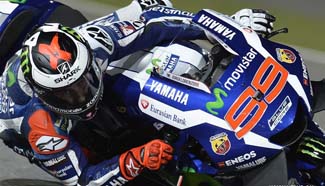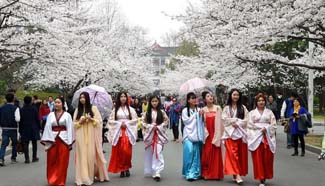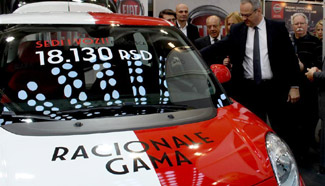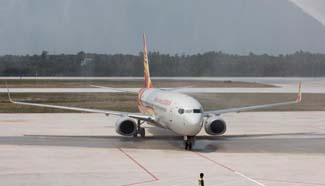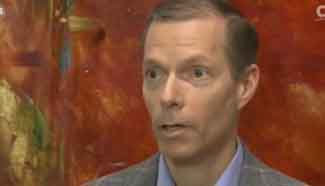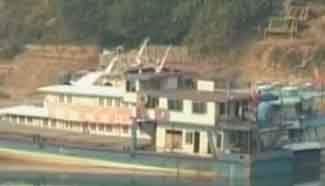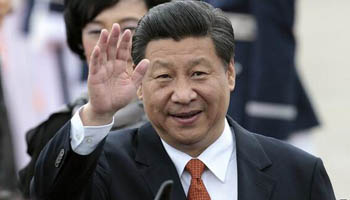The Ministry of National Defense held a press conference in Beijing on Jan. 11, 2016, where spokesman Wu Qian answered questions.
Wu said the Central Military Commission (CMC) had recently completed restructuring of its departments, and this should be regarded as a breakthrough in reforming the military command system. It was also a symbolic achievement for the overall strategy of strengthening the army. On Jan. 11, Chinese President Xi Jinping, also General Secretary of the Communist Party of China (CPC) Central Committee and Chairman of the CMC, met with the chiefs of each newly established agency. He warmly congratulated the inauguration of the new agencies and raised explicit requirements.
Reporter: What has changed with the restructuring?
Wu: The CMC reorganized the four headquarters – staff, politics, logistics and armaments – into 15 new agencies, which include seven departments: joint staff, political work, logistical support, equipment development, training, national defense mobilization and the general office. There are three commissions – discipline inspection, politics and law, and science and technology – and five more agencies: administration, auditing, international cooperation, reform and organizational structure, and strategic planning.
Reporter: What’s the purpose of transforming the headquarters system into a multi-organ system?
Wu: The headquarters system was formed over the years and has made significant contributions to the development of PLA. With the change of tasks and international situations, this system began to reveal problems. We reshuffled the headquarters system into a multi-organ one based on the general principle that the CMC leads and is responsible for frontline command and serving all services and arms. The CMC organs will focus on building and perfecting their respective functions, and combining overlapping functions, while supervision and coordination will also be enhanced under the new structure, so that the CMC organs will perform the advisory, executive and service roles. This adjustment will also be beneficial to strengthening the resolute leadership of Communist Party of China (CPC) over the PLA, and the CMC can better implement strategic plans, macro-management and control and supervision of power.
Reporter: What is the primary role of the Joint Staff Department?
Wu: The Joint Staff Department is responsible for combat planning, command control and battle command security, assessing military strategy and requirements, assessing combat capability, joint training and logistics preparedness.
Reporter: What are the major functions of the Political Work Department?
Wu: The Political Work Department covers the PLA’s overall political and organization work. It is responsible for political education and human resources management. It needs to be stressed that the CPC work is fundamental and key to the military. The PLA has a tradition of valuing political work. In this round of reforms, the military will stick to the code of absolute leadership of the CPC. We will strictly implement policies including the Party committee system, the political commissar system and the political department system, and deploying political work staff and perfecting grassroots-level Party organizations to strengthen CPC work construction in the PLA.
Reporter: How is the logistics system of the PLA restructured?
Wu: The Logistics Department is responsible for making logistics plans, policy study and setting standards. The relationship between logistics and command will be adjusted and improved.
Reporter: How has the military equipment system altered?
Wu: The Equipment Development Department plans military equipment development, conducts R&D, and manages procurement and information systems. The department will follow a centralized management model, while different services conduct their respective construction and all the resources will be jointly utilized among all the war zones.
Reporter: Why is it necessary to establish the Training and Administration Department?
Wu: Training is routine for the army. The new department will help unify the plan and practice of military training, so as to better administer the army and military academies. Military training will be closely integrated with military administration to promote actual combat training.
Reporter: What’s the logic behind establishing the National Defense Mobilization Department?
Wu: It is necessary to strengthen defense mobilization while the PLA cuts regular troop numbers. The department will be responsible for guiding national defense mobilization and building reserve forces. It will also lead the provincial military regions, and is an important move to establish a defense mobilization system with Chinese characteristics.
Reporter: What are the measures to enhance military supervision?
Wu: The reshuffle establishes a new Discipline Inspection Commission, and discipline inspection groups have been sent to all the CMC organs and frontlines. This practice will promote the implementation of a dual system that strengthens the independence and authority of discipline inspection organs.
Reporter: Why is it necessary to establish the Politics and Law Commission?
Wu: The Politics and Law Commission can strengthen the leadership of the CMC over the military and is beneficial to deepening strict management of the army in accordance with the law. It also helps to prevent and punish misconduct and breaches, so as to maintain the PLA’s purity and integrity.
Reporter: What is the purpose of the Science and Technology Commission?
Wu: The promotion of national defense technology is an inevitable requirement for the realization of defense and military modernization. The commission will help boost strategic management of national defense science, promote independent innovation and coordinate civilian-military technology integration.
Reporter: Why is there an Office for Strategic Planning?
Wu: The office will perfect the overall strategic planning of the PLA, promote the administrative functions of the CMC, and improve the quality and effectiveness of national defense building.
Reporter: What is the main function of the Office for Reform and Organization?
Wu: The office is responsible for the planning, preparation and coordination of national defense reform. It directs the implementation of major reforms and administers the personnel affairs of the PLA.
Reporter: Is there any move to promote international military cooperation?
Wu: The Office for International Military Cooperation is being established to conduct foreign exchanges and cooperation, and manage foreign affairs of a military nature. This shows China’s sincere wish to expand international exchanges and cooperation, and to maintain world peace and stability. We wish to promote communication and cooperation in various fields.
Reporter: Will any reform measures enhance military auditing supervision?
Wu: The Audit Office will be responsible for military auditing and supervision. The auditing system is reformed so that auditing work groups will be sent to all military organs to improve auditing independence.
Reporter: Why is it necessary to build the Agency of Offices Administration?
Wu: The agency is in charge of management and logistical support of various CMC organs and affiliated institutions. It focuses on general management to cut redundant support staff and boost effective use of resources.

